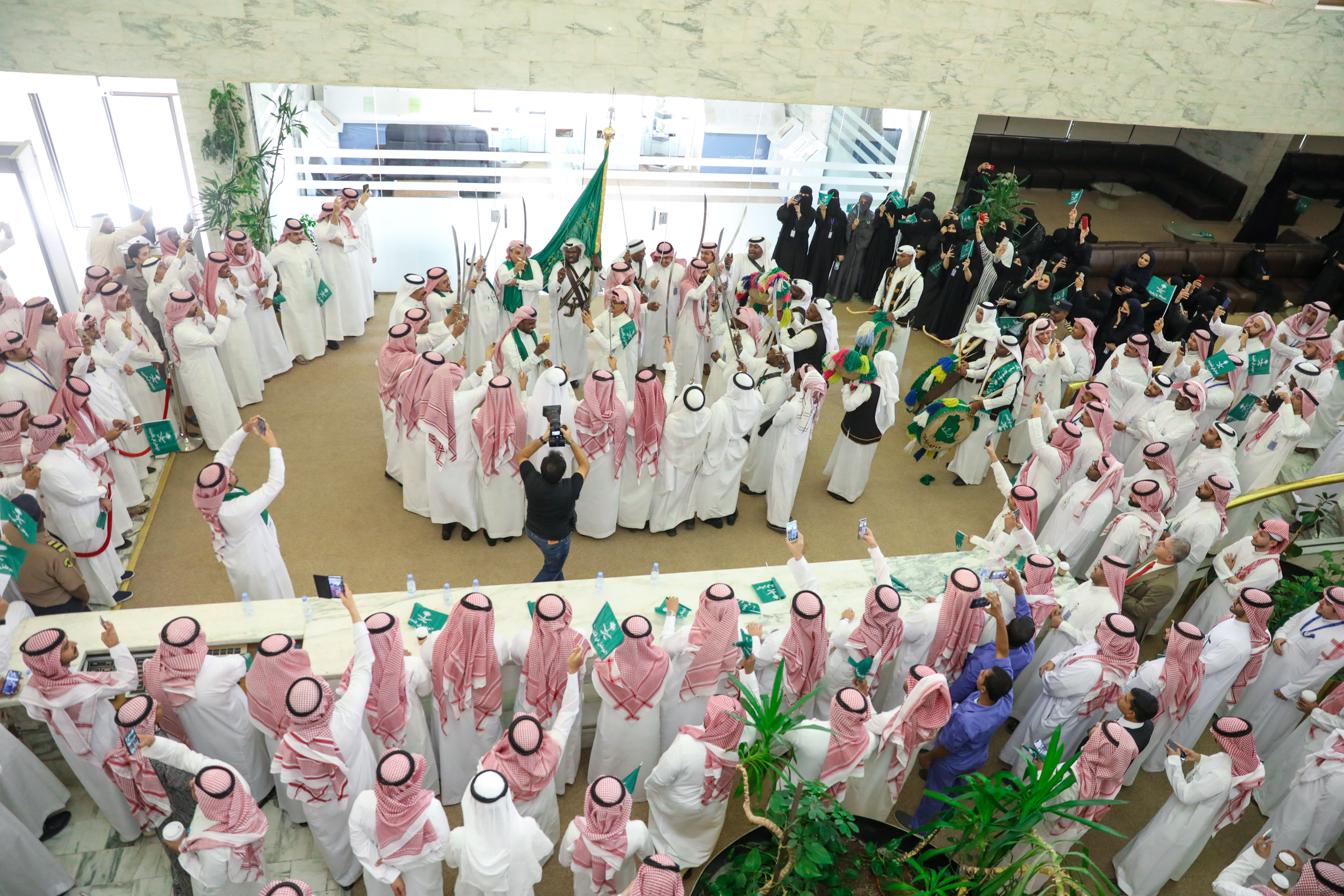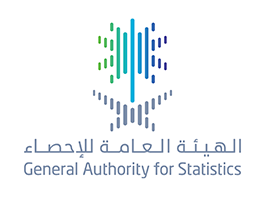Official government website of the Government of the Kingdom of Saudi Arabia
Links to official Saudi websites end withgov.sa
All links to official websites of government agencies in the Kingdom ofSaudi Arabia end with .gov.sa
Government websites use theHTTPSprotocol for encryption and security.
Secure websites in the Kingdom of Saudi Arabia use the HTTPS protocolfor encryption.

The employees of the General Authority for Statistics celebrate the 89th National Day
01-10-2019

رئيس هيئة الإحصاء: نقف على أعتاب مرحلة جديدة لنتحدث عن منجزات وطننا بلغة الأرقام الإحصائية
21-09-2019
GASTAT: A decrease in the unemployment rate of total Saudis to (12.3%) and an increase in the economic participation rate of Saudi females to (23.2%)
15-09-2019
According to the results of the labour market bulletin for the second quarter of 2019, the unemployment rate of the total population decreased to (5.6%) GASTAT: A decrease in the unemployment rate of total Saudis to (12.3%) and an increase in the economic participation rate of Saudi females to (23.2%) On Thursday, Muharram 13th, 1441H. (September 12th, 2019), GASTAT released the Labour Market Bulletin for the second quarter of 2019 on its official website www.stats.gov.sa . The bulletin is based on the estimates of the Labour Force Survey conducted by GASTAT on a quarterly basis as well as the labour market data from the administrative records of the relevant entities (Ministry of Labour and Social Development, Ministry of Civil Service, General Organization for Social Insurance, Human Resources Development Fund, and National Information Center). The results of the second quarter of 2019, based on the estimates of the labour force Survey, showed a decrease in the unemployment rate of total population (15 years and above) which reached (5.6%) compared to (6%) in the first quarter of 2019. With regard to Saudis’ unemployment rate, the results showed a decrease in the unemployment rate of total Saudis (males and females who are 15 years old and above) reaching (12.3%) based on the estimates of the Labour Force Survey (2019, Quarter 2) compared to (12.5%) in the first quarter of the same year. The results of the survey also showed an increase in the economic participation rate of total Saudis (males and females (15+)) reaching (45.0%) in the second quarter of 2019 compared to (42.3%) in the previous quarter. The economic participation rate among Saudi females increased to reach (23.2%) compared to (20.5%) in the previous quarter. Based on the data of the administrative records of the second quarter of 2019, the results of the bulletin also showed that the total number of employed Saudis (males and females) recorded a decrease reaching (3.090.248) employee in the second quarter of 2019 compared to (3,112,029) in the first quarter. According to the results of the bulletin and based on the data from the Ministry of Civil Service (Jadarah and Sa’ed) and the data from the Human Resources Development Fund (Taqat), the total number of Saudi job seekers reached (1.002.855) based on the administrative records in Saudi Arabia during the second quarter of 2019. GASTAT has defined jobseekers as Saudi individuals (males and females) registered in job seeking programs of the Ministry of Civil Service (Jadarh and Sa’ed) as well as Human Resources Development Fund (Taqat) where they entered their personal data, qualifications, experiences, and CVs electronically. Jobseekers included in the administrative records are not subjected to the internationally recognized criteria and conditions of the International Labor Organization (ILO); hence, not all of them are considered unemployed individuals. Therefore, not every job seeker is an unemployed individual; they may be looking for a work while still working in another job, as in the case of job seekers in the government sector where they work for their own business and not registered as employees in the governmental administrative records (Civil Service, Social Insurance, commercial registers, and municipal licenses).

GASTAT: releases Consumer Price Index(CPI) Monthly Report for July,2019
29-08-2019

The employees of the General Authority for Statistics celebrate the 89th National Day
01-10-2019

رئيس هيئة الإحصاء: نقف على أعتاب مرحلة جديدة لنتحدث عن منجزات وطننا بلغة الأرقام الإحصائية
21-09-2019
GASTAT: A decrease in the unemployment rate of total Saudis to (12.3%) and an increase in the economic participation rate of Saudi females to (23.2%)
15-09-2019
According to the results of the labour market bulletin for the second quarter of 2019, the unemployment rate of the total population decreased to (5.6%) GASTAT: A decrease in the unemployment rate of total Saudis to (12.3%) and an increase in the economic participation rate of Saudi females to (23.2%) On Thursday, Muharram 13th, 1441H. (September 12th, 2019), GASTAT released the Labour Market Bulletin for the second quarter of 2019 on its official website www.stats.gov.sa . The bulletin is based on the estimates of the Labour Force Survey conducted by GASTAT on a quarterly basis as well as the labour market data from the administrative records of the relevant entities (Ministry of Labour and Social Development, Ministry of Civil Service, General Organization for Social Insurance, Human Resources Development Fund, and National Information Center). The results of the second quarter of 2019, based on the estimates of the labour force Survey, showed a decrease in the unemployment rate of total population (15 years and above) which reached (5.6%) compared to (6%) in the first quarter of 2019. With regard to Saudis’ unemployment rate, the results showed a decrease in the unemployment rate of total Saudis (males and females who are 15 years old and above) reaching (12.3%) based on the estimates of the Labour Force Survey (2019, Quarter 2) compared to (12.5%) in the first quarter of the same year. The results of the survey also showed an increase in the economic participation rate of total Saudis (males and females (15+)) reaching (45.0%) in the second quarter of 2019 compared to (42.3%) in the previous quarter. The economic participation rate among Saudi females increased to reach (23.2%) compared to (20.5%) in the previous quarter. Based on the data of the administrative records of the second quarter of 2019, the results of the bulletin also showed that the total number of employed Saudis (males and females) recorded a decrease reaching (3.090.248) employee in the second quarter of 2019 compared to (3,112,029) in the first quarter. According to the results of the bulletin and based on the data from the Ministry of Civil Service (Jadarah and Sa’ed) and the data from the Human Resources Development Fund (Taqat), the total number of Saudi job seekers reached (1.002.855) based on the administrative records in Saudi Arabia during the second quarter of 2019. GASTAT has defined jobseekers as Saudi individuals (males and females) registered in job seeking programs of the Ministry of Civil Service (Jadarh and Sa’ed) as well as Human Resources Development Fund (Taqat) where they entered their personal data, qualifications, experiences, and CVs electronically. Jobseekers included in the administrative records are not subjected to the internationally recognized criteria and conditions of the International Labor Organization (ILO); hence, not all of them are considered unemployed individuals. Therefore, not every job seeker is an unemployed individual; they may be looking for a work while still working in another job, as in the case of job seekers in the government sector where they work for their own business and not registered as employees in the governmental administrative records (Civil Service, Social Insurance, commercial registers, and municipal licenses).

GASTAT: releases Consumer Price Index(CPI) Monthly Report for July,2019
29-08-2019